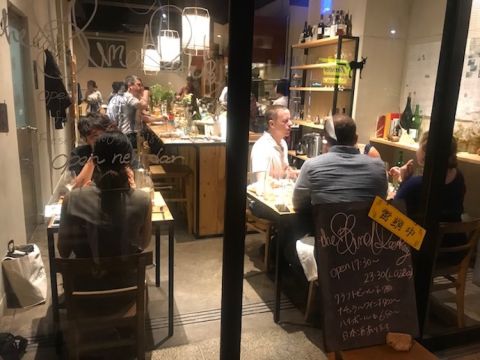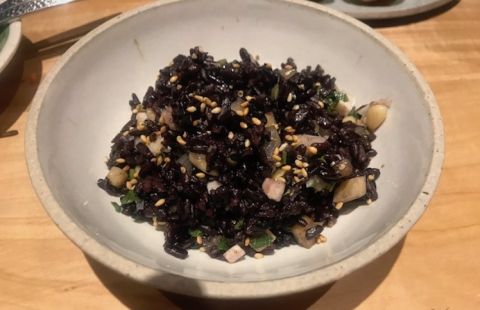The choice of where to eat on our last night in Tokyo, at the end of a week in which we had eaten extremely well, presented me with a particular dilemma.
The night before we had enjoyed an exceptional meal at the wine-minded Nogizaka-Shin restaurant, where the chef, Shinji Ishida, had excited us all with a series of extremely precise dishes based on his interpretation of seasonal Japanese ingredients. But I was looking for a restaurant that could prepare our digestive systems for a return to a more western style of food and one that would also offer a menu that we could choose from.
I am still not quite sure what led me to book at The Blind Donkey, a restaurant close to Kanda station in an area that, with its small streets full of restaurants and bars, reminded me of Soho. But it does possess an unforgettable name that derives from a fifteenth-century Zen Buddhist monk Ikkyu. And in Jérôme Waag it has a committed and talented chef as its co-owner.
Waag, 59, was born in Paris and grew up in Provence and the Côte d’ Azur before spending the next 30 years of his life in California, where he started cooking under Alice Waters at Chez Panisse in Berkeley, with the last four years as head chef. Here he was to learn about the importance of ingredients and the relevance to any self-respecting restaurant of establishing as close ties as possible with small, independent, often organic, producers.
Introduced to Japanese culture via film and Zen Buddhism, Waag first came to Tokyo in 2011 as part of OPENrestaurant, a collective he had started to talk about food, culture and politics. He returned to Japan every year before finally settling in Tokyo in late 2015 at a time when San Francisco was losing its bohemian culture, which Waag loved, and was becoming too expensive and risky a city in which to try and open a restaurant. By contrast, many chefs in Japan at that time were unaware of Waters’ approach to cooking in restaurants. In late 2018 Waag opened The Blind Donkey.
The restaurant has a glass frontage so you can easily see the lively scene in this decidedly informal restaurant from the pavement. Inside, the open kitchen faces you immediately with Waag and his fellow chef and business partner in their holding company Rich Soil & Co, Shinichiro Harakawa, at the stoves. In between is a counter, with a gap in, at which customers sit, eat and drink, watch and talk to the chefs.
The counter not only provides the chefs with their ingredients, but also reveals what they have made. Right in front of Waag was a vase containing a large display of mitsuba, Japanese wild chervil, which he picked to decorate plates and nibbled on occasionally.
The counter also held an excellent rhubarb galette that, with an equally impressive crème caramel (made from rich Tagayasu farm eggs), constituted their dessert menu.
It was as we walked past Waag and Harakawa that I saw what makes this restaurant tick. On the door of the wine storage – cellar would be too grand a word – there is a blackboard. Down the left-hand side are the table numbers while across the top are the 23 dishes on offer. As every order is taken it is chalked up; as every order is delivered it is crossed out. This clever silent way of communicating orders between customers and the open kitchen is an adaptation of a similar system in use at Chez Panisse.
In any restaurant that offers the small shared plates that are currently so fashionable there is a danger of too many dishes arriving either simultaneously or at an inappropriate time. But that would be to forget the amount of cooking experience behind these stoves.
We began with some crisp baguette and sourdough from Yoshida bakery with which we mopped up the marinated cucumber underneath the Shibuya Stand ricotta, though without any of the herb jam promised on the simple, daily-changing menu. This was followed by a slightly disappointing dish of bonito and aji (horse mackerel) sashimi with a spicy arugula salad before four rich and juicy grilled shrimps that had been spiced with black peppercorns.
We then moved on to a couple of carbohydrate dishes with Jancis ordering the fried Kitaakari potatoes, as much for the luscious aioli that was served alongside it, while I plumped for, and very much enjoyed, the more intriguing black ‘forbidden’ rice with takenoko (tender young bamboo shoots) and mitsuba. We finished with Waag and Harakawa’s interpretation of a bourride, incorporating a thick piece of hata, or grouper, a fish whose flavour was sweetened by the garlicky sauce, and a bill for 17,500 yen (£128) for two.
This bill also included four glasses of wine from a list entirely devoted to natural wines, in keeping with the owners’ approach to food. These were fine, if somewhat less exciting than the food.
There are many reasons for booking at The Blind Donkey. Its approach to sourcing; its open layout; and its friendly service are just three. But then there is also the charm of watching two ageing chefs still cooking side by side, obviously enjoying every second of what they are doing, while they give so much pleasure to their customers.
Nogizaka-Shin 1F, 11–19, Akasaka 8, Minato-ku, Tokyo, 107-0052; tel +81 (0)3-6721-0086
The Blind Donkey 3-17-4 Uchikanda, Chiyoda-ku, Kanda, Tokyo; tel +81 (0)3-6876-6349
















